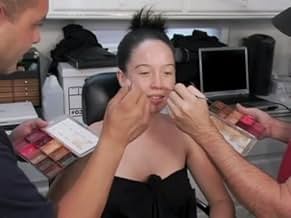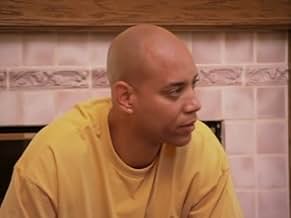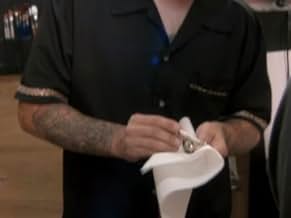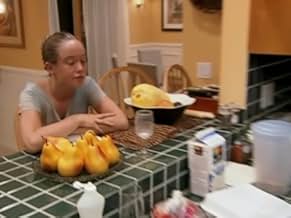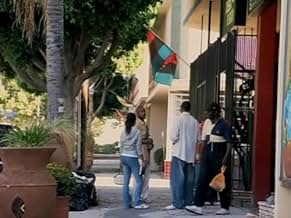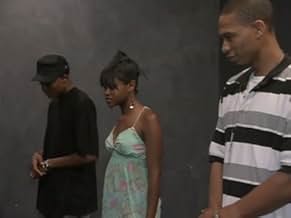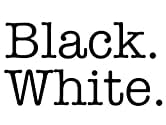अपनी भाषा में प्लॉट जोड़ेंA white family and a black family find out what it's like to switch lives.A white family and a black family find out what it's like to switch lives.A white family and a black family find out what it's like to switch lives.
- 1 प्राइमटाइम एमी जीते
- 1 जीत और कुल 1 नामांकन
एपिसोड ब्राउज़ करें
फ़ीचर्ड समीक्षाएं
I thought this was a very well developed idea that works on many different levels. First, we have the two "average" families composed of two parents and a child. The white family seems a little more offbeat with the overly accepting mother and the father who doesn't seem to see the racism in anything that happens around him. The daughter seems to be the only member of the family that is learning anything somewhat valuable during the whole transition. The black family seems to be more down-to-earth and likable. The father enjoys being "treated" as a white man and using the "white" talk that is often used as a hyper reality mockery of the formal talk that dave chapelle is usually found using when imitating/mocking the way white people talk. The mother is somewhat easygoing but gets irritated when listening to the ditsy white mother imitate "black" talk. The son is just a normal, shy kid who doesn't feel like he has to "act white" because he feels like he will be accepted for who he is. The way ideas clash between the families during their ventures out into LA are very interesting and sometimes comical. This is a great show for everyone and I hope that more people take to such a good thought provoking show about racial tension in the modern day.
The adults in that house aren't really great representatives of either race. The white adults are just really awkward and sheltered (especially the wife), and the black adults are extremely stubborn and too judgmental. I live in Chicago and the city and suburbs here are pretty diverse but at the same time very segregated. I don't think there is anything wrong with a person of any color finding comfort being in their own community, that's just how people are and that's not racist. This isn't a culture clash, this is a room full of idiots clashing. It didn't even take one episode to realize that these people just didn't like each other and weren't going to get along at all
Bruno is an oaf, his wife Carmen couldn't be more sheltered and naive, Brian and Renee are both stubborn and far more closed minded than Bruno and Carmen, which is ironic because they constantly accuse Bruno and Carmen of being closed minded. I think the most interesting thing about this show was when Bruno told Brian that he believes black people are conditioned to look for racism and misinterpret a lot of things as racism. I think that this is a fair statement, but I also think it's fair for black people to feel that way. I grew up hating the Green Bay Packers because my Dad is a Bears fan and Bears fans always hate Packers fans
Brian's parents grew up in the times of Rosa Parks and Martin Luther King Jr., they experienced some really ugly racism first hand! Is it implausible to have that sentiment passed down a few generations? Take a look at the teenagers in this show, they're the only ones who appear sane because they're so far displaced from that type of behavior because they just don't really have that type of experience anymore. I'm not saying that racism doesn't exist anymore, the truth is as long as there are people on earth there are going to be idiots, and as long as there are idiots, there is going to be racism. I honestly just wish that we had better representation all around on this show, the show definitely would be easier to watch if they had people who weren't such idiots.
I'm not a big fan of contrived social experiments and certainly don't think it's appropriate to extrapolate much out of a sample body of 2 families but I did appreciate the honesty of those who weren't aware that they were being filmed. From the store clerks who ran out of job applications, to the cop advocating racial profiling, to the drum circle crowd upset at the "interracial" couple and the line dancers shaking their heads at the "black" couple. These were the moments that makes one shake his head in resignation.
Although the end speechs were highly edited with jump cuts and melodramatic music, I was taken by the words of Kenny the self-proclaimed ex gangster. I was moved by his eloquent words and his heartfelt caring for Nick. He had the entire room transfixed on his words and his emotion and while he didn't speak to the issue of race he did reach out and connect with Nick in a way no one else in the show did. Indeed, it was quite sad to hear Nick say that he has never been close to anyone, including his own family. We can't solve the issues of race if we can't even bridge the disconnect in our families. As Kenny alluded, if we fail to realise the power in our relationships with the people around us, we will never realise our true potential. We should all start locally and then work outward from there.
Although the end speechs were highly edited with jump cuts and melodramatic music, I was taken by the words of Kenny the self-proclaimed ex gangster. I was moved by his eloquent words and his heartfelt caring for Nick. He had the entire room transfixed on his words and his emotion and while he didn't speak to the issue of race he did reach out and connect with Nick in a way no one else in the show did. Indeed, it was quite sad to hear Nick say that he has never been close to anyone, including his own family. We can't solve the issues of race if we can't even bridge the disconnect in our families. As Kenny alluded, if we fail to realise the power in our relationships with the people around us, we will never realise our true potential. We should all start locally and then work outward from there.
FX's "Black. White." was a curious concept. This was a limited run series (6 episodes) that promised some kind of earth-shattering revelations about the state of race in America today.
The premise: Two families, lined up as a Mother, a Father figure and teen, are there to learn about what sort of racism exists in what could otherwise be called "mainstream" America. The Caucasian Tribe are The Wurgel family (Carmen, Bruno and Rose). The African-Americans are The Sparks family (Rene, Brian and Nick). They trade places and take on the race of the other group, through the magic of makeup.
Now, I don't want to say this isn't an original idea, but Eddie Murphy did exactly this as a filmed segment on NBC's "Saturday Night Live" some 20 years before. It never claimed to give any "real" insights about people, but, it actually did suggest some thoughts about the differences in how whites get treated better than the darker skinned individuals in our society. Of course, the SNL segment was completely controlled, using actors in the parts of the people Murphy's straight-laced "White Guy" interacted with, and played strictly for laughs. Brilliantly.
In "Black. White." we're told we have a great experiment going on here, a real sociological examination of culture clash. Will people who cross the paths of these cosmetically enhanced performers be able to know that they are talking to people who are not what they appear to be?
At any rate, the two families lived under the same roof of a large house in a Los Angeles suburb, where they observed one another, shared information about their "different camps" and used what they learned in their guises to understand more about what it is to be the other.
The only one of the six participants who is *completely* convincing as their opposite is Rose, the white daughter turned black poetess. Her look, style and mannerisms seemed most true and she had a clear vision of the program's intentions, or really, what she hoped to gain from this project. Rose is also the only one who seemed to be "learning" anything about racism, culture, class, and ultimately, herself.
Conversely, the "adults" were all concerned with proving their pre-conceived notions about what racism is and what people had to say to them about it. And Rose's teen counterpart, Nick, admitted that he was only doing this for the fun of it. With that sort of attitude, "Black. White." really dissolves into a 21st Century Minstrel Show, with people getting made up and acting in the "stereotypical" manner to "fit in" with societal norms and provide entertainment for the viewing audience. There's not a lot of substantive learning going on here.
Also, the program was heavily edited, the stars spent hours in their makeup chairs and were subsequently placed in situations that were, at times, laughably unrealistic, and occasionally seemed more an exercise in tricking people, a la Ashton Kutcher's "Punk'd" than anything.
To the good, Rose is the saving grace of the program. Her sense of this being an opportunity to understand these issues, the trust and the truth that she has for her interactions and the honesty of her heart in wanting to grasp what's going on shines brightly. She is the only reason to watch.
The rest of it, we can all do without. The name calling, the misunderstandings turned into arguments, the tunnel vision, the wanting to use certain epithets, and the lack of intention and interest that the other participants had, brought the show way down.
Famed rapper Ice Cube is one of the executive producers of the program, and he performs the show's theme song ("Race Card") as well.
There are some worthwhile moments, so I don't want to knock this completely. It is an interesting idea, but it fails in the execution. If all six people involved had the same open-mindedness and same attitude about the concept as Rose clearly did, this could have been what it claims to be. Then again, were the participants all "open minded," they wouldn't have needed to have this experience.
The premise: Two families, lined up as a Mother, a Father figure and teen, are there to learn about what sort of racism exists in what could otherwise be called "mainstream" America. The Caucasian Tribe are The Wurgel family (Carmen, Bruno and Rose). The African-Americans are The Sparks family (Rene, Brian and Nick). They trade places and take on the race of the other group, through the magic of makeup.
Now, I don't want to say this isn't an original idea, but Eddie Murphy did exactly this as a filmed segment on NBC's "Saturday Night Live" some 20 years before. It never claimed to give any "real" insights about people, but, it actually did suggest some thoughts about the differences in how whites get treated better than the darker skinned individuals in our society. Of course, the SNL segment was completely controlled, using actors in the parts of the people Murphy's straight-laced "White Guy" interacted with, and played strictly for laughs. Brilliantly.
In "Black. White." we're told we have a great experiment going on here, a real sociological examination of culture clash. Will people who cross the paths of these cosmetically enhanced performers be able to know that they are talking to people who are not what they appear to be?
At any rate, the two families lived under the same roof of a large house in a Los Angeles suburb, where they observed one another, shared information about their "different camps" and used what they learned in their guises to understand more about what it is to be the other.
The only one of the six participants who is *completely* convincing as their opposite is Rose, the white daughter turned black poetess. Her look, style and mannerisms seemed most true and she had a clear vision of the program's intentions, or really, what she hoped to gain from this project. Rose is also the only one who seemed to be "learning" anything about racism, culture, class, and ultimately, herself.
Conversely, the "adults" were all concerned with proving their pre-conceived notions about what racism is and what people had to say to them about it. And Rose's teen counterpart, Nick, admitted that he was only doing this for the fun of it. With that sort of attitude, "Black. White." really dissolves into a 21st Century Minstrel Show, with people getting made up and acting in the "stereotypical" manner to "fit in" with societal norms and provide entertainment for the viewing audience. There's not a lot of substantive learning going on here.
Also, the program was heavily edited, the stars spent hours in their makeup chairs and were subsequently placed in situations that were, at times, laughably unrealistic, and occasionally seemed more an exercise in tricking people, a la Ashton Kutcher's "Punk'd" than anything.
To the good, Rose is the saving grace of the program. Her sense of this being an opportunity to understand these issues, the trust and the truth that she has for her interactions and the honesty of her heart in wanting to grasp what's going on shines brightly. She is the only reason to watch.
The rest of it, we can all do without. The name calling, the misunderstandings turned into arguments, the tunnel vision, the wanting to use certain epithets, and the lack of intention and interest that the other participants had, brought the show way down.
Famed rapper Ice Cube is one of the executive producers of the program, and he performs the show's theme song ("Race Card") as well.
There are some worthwhile moments, so I don't want to knock this completely. It is an interesting idea, but it fails in the execution. If all six people involved had the same open-mindedness and same attitude about the concept as Rose clearly did, this could have been what it claims to be. Then again, were the participants all "open minded," they wouldn't have needed to have this experience.
...And I can honestly my jaw dropped. I just couldn't believe it. Hollywood makeup effects artist Keith VanderLaan (whose work on "Big Momma's House" and "White Chicks" has not gone unnoticed) has done the unthinkable by transforming a black family into a white family, and a white family into a black family. The Sparks, is the black family (Brian, his wife Renee, son Nick) from an Atlanta suburb and the white Wurgel-Marcotulli family (Carmen, her live-in boyfriend Bruno, Carmen's daughter Rose) from Santa Monica, California, must live together and walk and talk, as the opposite race.
Now before I heard about this show, courtesy of the rants of the many EB Soldiers at Public Enemy's official website message boards, I have to say I first met "Black. White." with great skepticism. But as I heard more about it, and even though I agree largely with the rants of the EB Soldiers, I was still enticed. I wanted to see more, and what I saw tonight was nothing short of an outstanding examination of how the black and white races interact with one another and as each other.
As a 20-year-old black male, "Black. White." not only forced to me to take into account what whites think and experience, but it also made room for me to ponder my own conceptions about myself, and my fellow brothers and sisters in America. Bruno and Carmen and Brian and Renee all attend separate black/white focus groups, in disguise, and each gets a taste of what the other race feels about the other race. Before the meetings, though, the participants gave their companions advice on how to "act" while listening to the discussion; Brian says Bruno should slouch a little bit and Bruno says Brian should keep an upright, or otherwise proper posture. We can see them nervously squirming in their seats as they all get anxious about the discussions taking place. I couldn't help but feel the heat too.
Hopefully, this show will open eyes, minds, and hearts about walking a mile in the shoes of somebody different. According to the Style section of today's Washington Post newspaper, the show's creator R.J. Cutler seems to know all about this sort of touchy reality thing. He produced "Super Size Me" (2004) filmmaker Morgan Spurlock's "30 Days" (damn, I really wanted to see that show), which frequently had similar role-swapping role-playing that included a fundamentalist Christian living with a Muslim family and a straight homophobe taking up residence in San Franciso's openly-gay Castro district.
Rapper Ice Cube, who is no stranger to politics and the racial divide in America, also did the opening theme song and is the show's co-producer and that should hopefully draw in more viewers, particularly those who pay attention to political hip-hop.
What we may see on "Black. White." may not be new to a lot of us, and I won't disagree with anyone who says otherwise. What it will do, I hope, is show what America is like from the other side for these six people. It shows much promise. The dynamics of racism, as portrayed often in the media, is sour compared to what really goes on out there. We can no longer turn a blind eye and a deaf ear to this cancerous epidemic in our country.
Now let's see what the other side says.
Now before I heard about this show, courtesy of the rants of the many EB Soldiers at Public Enemy's official website message boards, I have to say I first met "Black. White." with great skepticism. But as I heard more about it, and even though I agree largely with the rants of the EB Soldiers, I was still enticed. I wanted to see more, and what I saw tonight was nothing short of an outstanding examination of how the black and white races interact with one another and as each other.
As a 20-year-old black male, "Black. White." not only forced to me to take into account what whites think and experience, but it also made room for me to ponder my own conceptions about myself, and my fellow brothers and sisters in America. Bruno and Carmen and Brian and Renee all attend separate black/white focus groups, in disguise, and each gets a taste of what the other race feels about the other race. Before the meetings, though, the participants gave their companions advice on how to "act" while listening to the discussion; Brian says Bruno should slouch a little bit and Bruno says Brian should keep an upright, or otherwise proper posture. We can see them nervously squirming in their seats as they all get anxious about the discussions taking place. I couldn't help but feel the heat too.
Hopefully, this show will open eyes, minds, and hearts about walking a mile in the shoes of somebody different. According to the Style section of today's Washington Post newspaper, the show's creator R.J. Cutler seems to know all about this sort of touchy reality thing. He produced "Super Size Me" (2004) filmmaker Morgan Spurlock's "30 Days" (damn, I really wanted to see that show), which frequently had similar role-swapping role-playing that included a fundamentalist Christian living with a Muslim family and a straight homophobe taking up residence in San Franciso's openly-gay Castro district.
Rapper Ice Cube, who is no stranger to politics and the racial divide in America, also did the opening theme song and is the show's co-producer and that should hopefully draw in more viewers, particularly those who pay attention to political hip-hop.
What we may see on "Black. White." may not be new to a lot of us, and I won't disagree with anyone who says otherwise. What it will do, I hope, is show what America is like from the other side for these six people. It shows much promise. The dynamics of racism, as portrayed often in the media, is sour compared to what really goes on out there. We can no longer turn a blind eye and a deaf ear to this cancerous epidemic in our country.
Now let's see what the other side says.
क्या आपको पता है
- ट्रिवियाA part of this experiment, was for the two families to live together in the same house. With their false identities, they found jobs, enrolled their kids in schools and at the end of each day shared their interactions amongst each other.
- कनेक्शनReferenced in Alex Meyers: the new Hunger Games movie is kinda dumb... (2024)
टॉप पसंद
रेटिंग देने के लिए साइन-इन करें और वैयक्तिकृत सुझावों के लिए वॉचलिस्ट करें
- How many seasons does Black. White. have?Alexa द्वारा संचालित
विवरण
- रंग
इस पेज में योगदान दें
किसी बदलाव का सुझाव दें या अनुपलब्ध कॉन्टेंट जोड़ें




